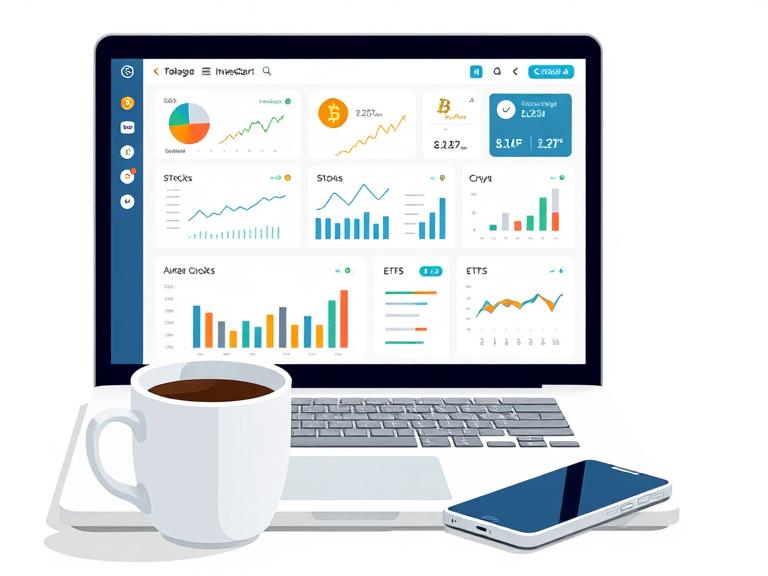Investing used to feel like something only the wealthy or Wall Street insiders could do. But not anymore. Thanks to technology and growing demand for financial freedom, anyone with a smartphone can now start investing with just a few taps.
From beginner-friendly robo-advisors to advanced platforms for seasoned traders, there are more options than ever to help you grow your money. But with so many choices, how do you find the right one?
In this article, we’ll walk you through the best investment platforms of 2025—each one designed with different goals, strategies, and experience levels in mind. Whether you’re looking to buy your first stock, automate your portfolio, or dive into cryptocurrency, we’ll help you find the platform that fits your needs.
Why Choosing the Right Platform Matters
Picking the right investment platform is like choosing a travel partner for a long journey. It needs to match your style, your pace, and your goals. Here’s what a good platform should offer:
- User-Friendly Interface: Easy to navigate, even for beginners.
- Low Fees: The less you pay in fees, the more you keep.
- Educational Resources: Tools to help you learn as you go.
- Diverse Investment Options: Stocks, ETFs, mutual funds, crypto, and more.
- Reliable Customer Support: When you have questions, you need answers fast.
Let’s break down the top choices.
1. Fidelity Investments
Best For: All-around investors, both new and experienced.
Fidelity remains one of the most trusted names in investing. It offers a strong mix of low-cost funds, powerful tools, and research.
Key Features:
- No commissions on stocks and ETFs
- Excellent retirement planning tools
- Robust research and news section
- 24/7 customer service
Pros:
- Highly reputable
- No account minimums
- Great mobile app
Cons:
- Interface can feel overwhelming for beginners
2. Robinhood
Best For: Beginner investors and casual traders.
Robinhood made waves by pioneering commission-free trading and a sleek mobile-first design. It’s ideal for users who want to quickly buy and sell stocks or crypto.
Key Features:
- Commission-free trades
- Real-time market data
- Crypto trading supported
- User-friendly mobile app
Pros:
- Simple, easy to use
- No account minimum
- Great for stock and crypto trading
Cons:
- Limited educational content
- No mutual funds or retirement accounts
3. Charles Schwab
Best For: Long-term investors seeking reliability.
Charles Schwab combines tradition with innovation. Their low fees, wide investment options, and customer support make them ideal for building wealth.
Key Features:
- Free trading on U.S. stocks and ETFs
- Fractional shares available
- Excellent retirement and IRA options
- Research tools powered by Morningstar and others
Pros:
- Strong reputation
- Good for all investor levels
- No-fee robo-advisor available
Cons:
- Platform can be a bit dense for mobile-only users
4. M1 Finance
Best For: Passive investors and DIY portfolio builders.
M1 Finance merges the best of robo-advisors and self-directed investing. It lets you build custom “Pies” (portfolios) of stocks and ETFs and automates the rest.
Key Features:
- Automated investing
- Custom portfolio templates
- No trading fees
- Built-in rebalancing
Pros:
- Great for long-term investors
- Fractional shares
- No commissions
Cons:
- No real-time trading (orders go in once per day)
- Less ideal for active traders
5. Betterment
Best For: Investors who want automation and no stress.
Betterment is a robo-advisor that builds and manages your investment portfolio based on your goals and risk tolerance. It’s hands-off and ideal for people who want simplicity.
Key Features:
- Automatic rebalancing
- Tax-loss harvesting
- Personalized advice
- Goal-based planning
Pros:
- Very beginner-friendly
- Great customer support
- Affordable management fees (0.25% per year)
Cons:
- No individual stock trading
- Annual fee adds up over time
6. eToro
Best For: Social and crypto investors.
eToro offers a unique platform where you can follow, copy, and learn from other traders. It’s particularly strong in cryptocurrency and foreign stocks.
Key Features:
- Social trading (copy portfolios)
- Crypto trading support
- Fractional shares
Pros:
- Community aspect is helpful
- Easy to use
- Great for international exposure
Cons:
- Limited investment types (no mutual funds or retirement accounts)
- Spreads on trades can be high
Comparison Table
| Platform | Best For | Commission-Free? | Key Feature |
|---|---|---|---|
| Fidelity | Comprehensive investors | Yes | Strong retirement tools |
| Robinhood | Beginners and casual traders | Yes | Fast, mobile-first trading |
| Schwab | Long-term investors | Yes | Research and support |
| M1 Finance | Passive DIY investors | Yes | Portfolio automation |
| Betterment | Fully automated investing | N/A (0.25% fee) | Robo-advisor simplicity |
| eToro | Social/crypto investors | Yes | Copy trading |
What to Consider Before Choosing
Before you sign up for a platform, consider the following:
- Your Goals: Are you investing for retirement, passive income, or short-term growth?
- Experience Level: Some platforms assume you know what you’re doing. Others teach you along the way.
- Cost Structure: Even small fees eat into returns over time.
- Available Assets: Do you want access to ETFs, crypto, or just basic stocks?
- Customer Service: Can you get help when you need it?
Tips for Using Your Investment Platform Effectively
Once you pick a platform, maximize its benefits with these tips:
- Set clear goals: Know whether you’re investing for retirement, a house, or building wealth.
- Automate contributions: Set up auto-deposits to invest regularly without thinking about it.
- Rebalance your portfolio: Especially if you’re doing it yourself, check your asset mix yearly.
- Use educational tools: Take advantage of blogs, videos, and simulators.
- Stay calm during market dips: Emotional investing is the fastest way to lose money.
The Future of Investing Platforms
In 2025 and beyond, expect to see platforms:
- Integrate AI for smarter insights
- Offer more ESG (environmental, social, governance) options
- Expand into global markets
- Provide more holistic financial planning tools
Investing is becoming more personal and more accessible. You no longer need to be a finance expert—just curious, consistent, and a little bit patient.
Final Thoughts
Your investment platform is your financial home base. Whether you’re a complete beginner or managing a growing portfolio, the right platform can make the difference between guessing and growing.
Start by asking what kind of investor you are. Then pick the platform that makes it easy to be that investor every day.
In a world where anyone can invest, the most important thing is simply to get started. The earlier you begin, the more time your money has to grow.
So sign up, explore, and plant the seeds of your financial future today.




